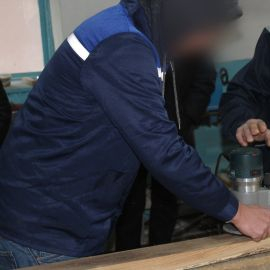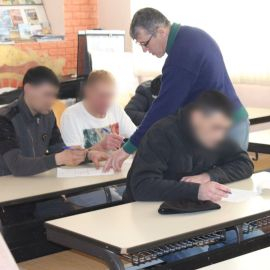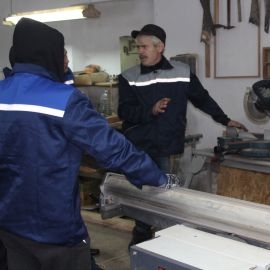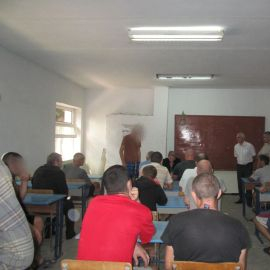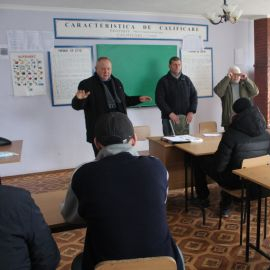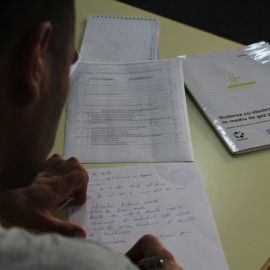back
Graces are not an impediment to obtaining a profession
Criminal punishment did not deprive them of their right to education. We're talking about male and female prison inmates who, despite being behind bars, are continuing their secondary education or have decided to learn a trade.
Criminal punishment did not deprive them of their right to education. We're talking about male and female prison inmates who, despite being behind bars, are continuing their secondary education or have decided to learn a trade. Human rights experts are encouraging the authorities to offer prisoners the opportunity to pursue university studies (bachelor's or master's) and prisoners - to learn a trade that will help them reintegrate more easily into society after serving their sentence. Eugen (n.r. - at the request of the protagonist, I changed his first name) was sentenced in 2012 to twelve years in prison for economic crimes, and was ordered by the court to serve his sentence in the semi-closed penitentiary no.2 in the town of Lipcani, Briceni district. He says he ended up behind bars by an unfortunate accident. Knowing that he would spend a long time behind bars, he decided to keep studying, even though he already had a university degree. So he spent two of his seven years in prison studying vocational training. "When I got here, my father told me: if you can learn, learn. I've always liked learning and learning something new. Even though studying in the penitentiary wasn't compulsory, I took the opportunity. First I enrolled in the "wood and birch bark carver" speciality, and a year later I enrolled in the "locksmith-assembler" speciality. From the penitentiary we were given notebooks, pens and pencils. Lessons took place as usual, just like in freedom, with teachers from the vocational school who came to the prison. After a year of study, we also prepared the coursework, which we defended in front of the committee of the Vocational School in Briceni", says Eugen. He says that not all prisoners want to learn, even if the study process is not complicated: "There were about 20 boys, the rest were not really interested. Usually, all those who have some books left are interested in studying." He was recently released, but is still under probation supervision. He is convinced that the job he learned behind bars will serve him well in life. "I haven't got a job anywhere yet, but I know for sure that everything I've learned here will be useful later on. Besides, the time hasn't gone by in vain and it's even gone by faster. You know what they say: in prison, the convict must always be busy (laughs) and I chose to learn. I encourage all prisoners to take advantage of their right to education," says Eugen. They can choose from 18 trades offered by 11 vocational schools There are 17 prisons in Moldova, where more than 5 700 people are serving their sentences. The right of convicts to education is laid down in Moldova's Enforcement Code, and training is part of the individual sentence enforcement programme, which is determined after the prisoner's assessment. Varvara Dohotaru, head of the social reintegration directorate of the National Administration of Penitentiaries (ANP), which is responsible for education in prisons, says that teaching methods in prisons are set by the Ministry of Education and the administration of each prison provides conditions for lessons and ensures the security of teachers during classes. "Education includes several activities. We have a literacy programme for prisoners who can neither read nor write. Another form of education is gymnasium training for minors who come into detention. Gymnasium training is also carried out in the remand prisons, with detainees who are being prosecuted and with detainees transferred to the juvenile prison. We also have vocational training which is only done in prisons. Our aim is to re-educate and re-socialise people in prison. We want today's prisoner to be able to return to a normal life when they return to society. If he or she needs a specialty he or she couldn't get before being sentenced, then he or she can get it here. Later, on release, he or she will be able to re-socialise more easily and have a better chance of finding a job." According to the ANP, 538 inmates were enrolled in vocational studies in the 2019-2020 academic year, and 94 juvenile inmates received secondary education. After graduating from gymnasium, male and female inmates can continue their studies in vocational training and have a choice of 18 trades offered by 11 vocational schools, affiliated to prisons. At the end, those enrolled in studies can obtain diplomas as electrician, plasterer, wood carver, baker, tailor, barber, etc. An advantage for graduates is that the certificate of studies/speciality does not mention that they obtained their diploma in prison. Education behind bars helps prisoners reintegrate socially Human rights expert Ana Racu, a member of the UN Committee against Torture, says that ensuring the safety of prisoners and their social reintegration are two of the major goals of the prison system. "Education is the foundation of the social reintegration process, that's why it's so important, it's the bridge on which a person who has been isolated for a while can return home better educated. Through training programmes, whether general schooling or vocational guidance, education contributes to increasing the level of knowledge, skills and attitudes of prisoners. This opportunity should be explored. Education is not just a desideratum or something ancillary to the prison environment, but an internationally enshrined right, laid down in international treaties and standards in the field of respect for prisoners' rights, such as the Recommendation of the Committee of Ministers of the Member States of the Council of Europe on European Prison Rules and the Standard Minimum Rules for the Treatment of Prisoners adopted by the United Nations," says the expert. Ana Racu advises authorities to give prisoners the opportunity to benefit from higher education, especially now, in the pandemic, when some higher education institutions are running distance or online courses. Mariana Jacot
